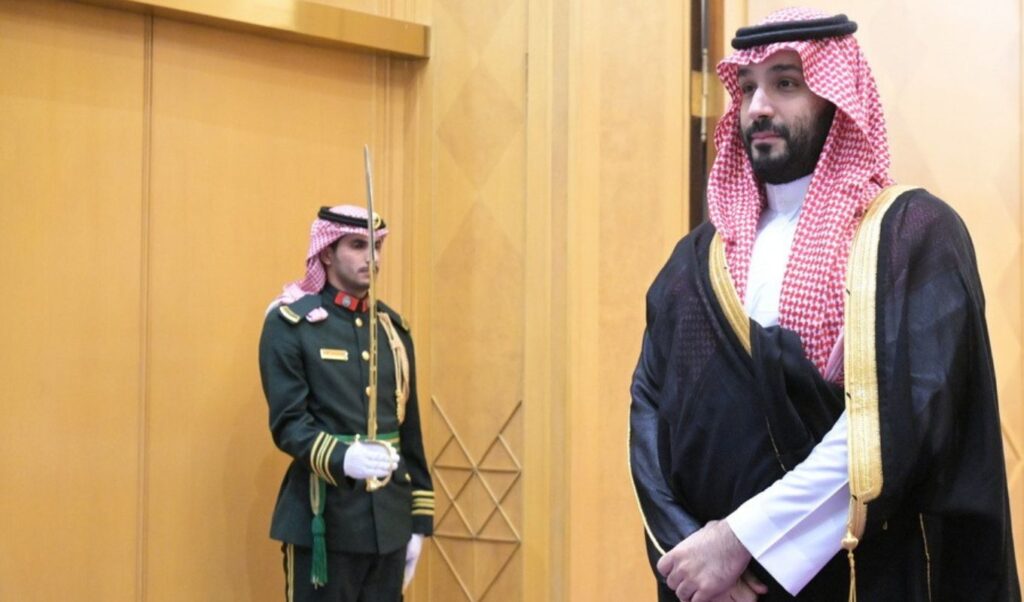In his first visit to the White House since the assassination of Saudi journalist Jamal Khashoggi, which sparked global outrage, Saudi Arabia’s crown prince Mohammed bin Salman aims to reclaim his role on the international stage and prove to American President Donald Trump that supporting his powerful leadership was justified. Tuesday’s meeting between Trump and the de facto leader of Saudi Arabia, known as MBS, highlights a relationship built on strategic interests, according to Reuters.
Seven years later, bin Salman now appears as a peace mediator, restoring relations with Iran, pushing for a ceasefire in Gaza and bringing Syria back into the Arab community, in a remarkable turnaround for the prince who was once characterized as reckless due to his involvement in the Yemen war.
Simultaneously reformist and authoritarian, bin Salman has now become the most significant and daring leader in modern Saudi Arabian history.
In his homeland, in less than a decade, the 40-year-old has initiated a social revolution unlike any since his grandfather, King Abdulaziz, created the kingdom from desert tribes and sealed the fateful alliance with Washington.
The prince has neutralized the once fearsome religious police, sidelined clerics and abolished decades of strict social rules. Women now drive, work and socialize freely with men – freedoms once punished by flogging. In a kingdom that once forced women to wear mandatory black abayas and hijabs, pop stars and fashion shows now illuminate Riyadh, reshaping Saudi Arabia’s image from a closed theocracy to a country racing toward modernity.
In scenes unthinkable just a few years ago, Jennifer Lopez and Camila Cabello recently thrilled audiences on Riyadh’s stage – Lopez in a glittering bodysuit and Cabello in a sheer dress – as Elie Saab models flooded the runway before an audience including Hollywood stars Halle Berry and Monica Bellucci.
But the same hand that opened Saudi society has also tightened its grip on power. Any dissent is suppressed, critics are silenced, and rival power centers are imprisoned and dissolved.
What Mohammed bin Salman’s arrival at the White House signals for the international stage
Globally, the leader of the world’s top oil exporting country emerged unscathed from Khashoggi’s assassination by Saudi agents – a murder that US intelligence agencies linked to him. He denied ordering it but accepted responsibility as de facto leader. Then-presidential candidate Joe Biden said Saudi Arabia should become a pariah over Khashoggi’s murder. However, Washington ultimately proceeded guided by energy, defense and technology interests.
Trump’s return to the White House in 2025 reignited economic appetites: $600 billion in investment commitments from Saudi Arabia and mutual interest in a defense pact. “Khashoggi hasn’t been completely forgotten. But should the relationship between two major states be based exclusively on one incident, or should the broader US or Saudi Arabian interest for the future be considered?” said Douglas A. Silliman, president of the Arab Gulf States Institute in Washington.
When bin Salman lands in Washington, he will be welcomed with the luxury usually reserved for a future monarch. “It will be a pre-coronation moment,” said Steve Clemons, a Washington analyst, implying that the kingdom’s future now belongs to the young prince.
Paul Salem of the Middle East Institute noted that despite past crises – including the September 11, 2001 attacks when 15 hijackers were Saudi – the US and Saudi Arabia remain bound by the same cold calculation that has defined their relationship: shared interests in energy, defense and now artificial intelligence.
“Artificial intelligence is the oil of the 21st century and America needs the Gulf’s energy and capital,” Salem said, adding that defense constitutes the cornerstone of the relationship, with the US providing security guarantees.
Bin Salman’s face everywhere – What his rise signals
Bin Salman’s rise signals a generational change. He will be the first monarch descended from a grandson of the kingdom’s founder, King Abdulaziz, breaking a decades-old tradition.
From the beginning, he articulated his mission in bold terms: “Seventy percent of Saudis are under 30. We will not waste the next 30 years dealing with extremist ideas. We will destroy them today,” he declared in 2017 after his elevation to crown prince, promising to restore a “moderate, balanced Islam” open to the world.
Bin Salman’s rise began when his father, King Salman, ascended to the throne in 2015 and assigned him significant portfolios, including defense. In 2017, he overthrew his older cousin Mohammed bin Nayef as heir. Saudi television showed bin Salman kissing Nayef’s hand, in a choreographed gesture of unity that concealed the power grab.
His presence dominates public life: His photographs are in shopping malls, billboards and local media, while every initiative of his is considered a masterpiece. However, his methods remain opaque. Harsh crackdowns have silenced discussion about whether his economic ambitions can be realized.
Under bin Salman’s leadership, Saudi Arabia has conquered the global sports scene, attracting football personalities like Cristiano Ronaldo and securing hosting rights for the 2029 Asian Winter Games and the 2034 FIFA World Cup.




